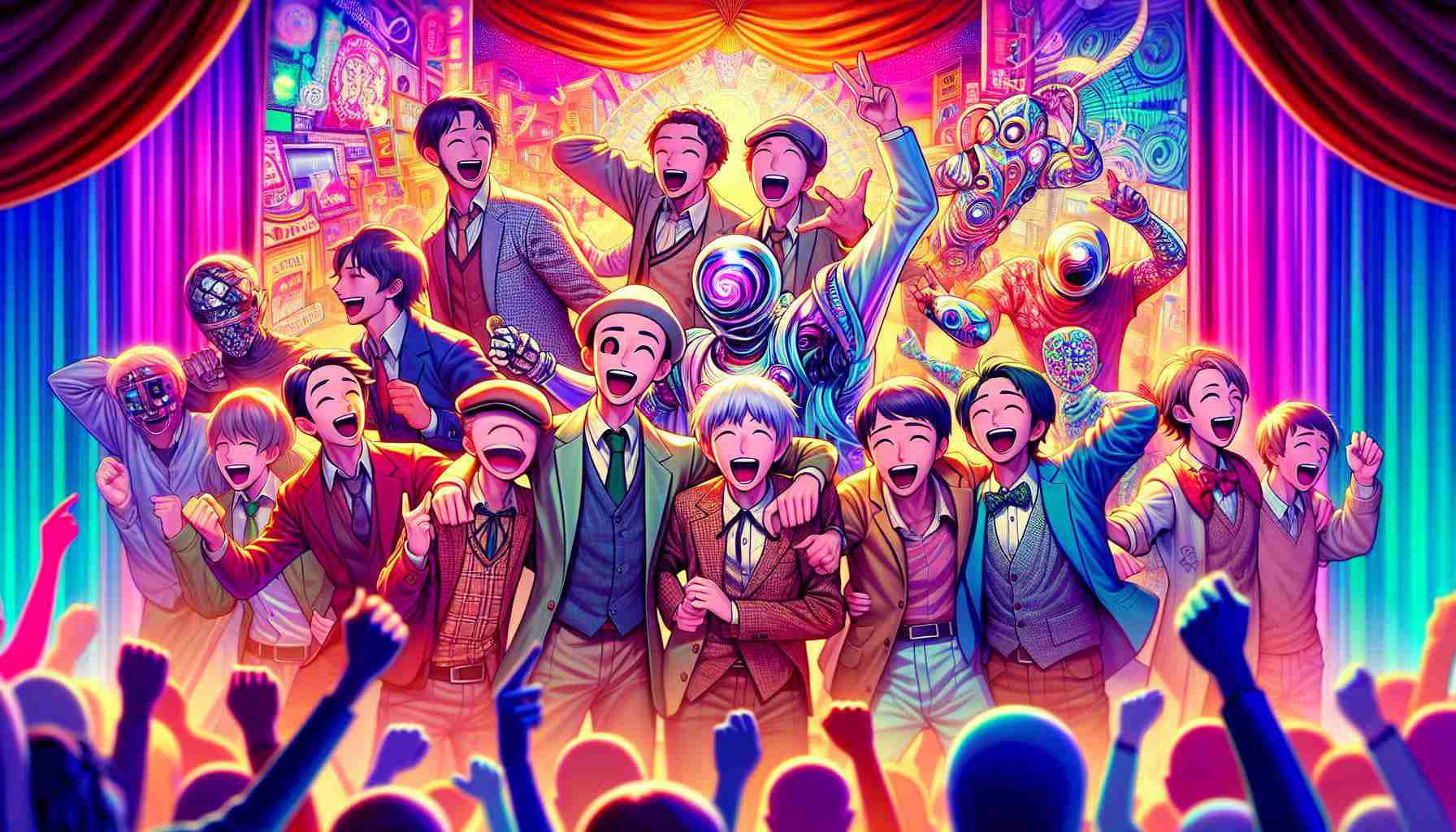- A late-night talk show featuring comedian Tsuda and his troupe, the “Tsuda Gundan,” transformed from a typical comedy segment into an exploration of camaraderie and ambition.
- The Tsuda Gundan is an exclusive group of performers who undergo rigorous evaluation to join, highlighting the importance of meeting demanding criteria for inclusion.
- Current members include comedians like Sekimachi, Yojou, and Shuhei, while former members such as Kanna and Komaba were excluded for not meeting the necessary conditions.
- The show’s latter half revealed personal insights and humorous quirks about Tsuda through poetic confessions from the gundan members.
- This segment underscored the troupe’s close-knit dynamics and showcased how shared experiences and humor are crucial to their continuing success.
A cacophony of laughter and revelations filled the studio as the unexpected unfolded during a late-night talk show, where famed comedian Tsuda and his eclectic group of performers, known as the “Tsuda Gundan,” took center stage. What promised to be a typical evening morphed into a captivating exploration of camaraderie and ambition within the comedy scene.
The stage belonged to Tsuda’s Gundan, a camaraderie built on laughter yet bound by rigorous criteria. Among its members are the likes of Sekimachi from Rice, Yojou of Gakutensoku, and Shuhei from Two Tribe. These comedians are part of a select club, having endured Tsuda’s demanding evaluation to earn their spots. Once part of this exclusive circle were Kanna from Hannya and Komaba of Milk Boy, who faced the harsh fate of exclusion for failing to meet certain conditions. What might these imposing prerequisites be, one wonders?
As the show transitioned to its latter half, an unexpected twist ensued. The gundan members began sharing cryptic musings, unveiling their sentiments toward Tsuda through poetic confessions. In these verses, hidden truths emerged—whether it’s Tsuda’s notably petite shoes borrowed from women’s collections or his peculiar theories about sunglasses, a multifaceted portrayal of the comedian surfaced.
This segment of shared quirks and lighthearted complaints illuminated not just the idiosyncrasies of Tsuda but also the tight-knit complexities of the troupe. In a world where the spotlight often shines on individual triumphs, this 49-minute glimpse unveiled that the foundation of enduring success often lies in shared struggles and inside jokes, leaving viewers both amused and introspective.
Revealed: The Hidden Hierarchies and Quirks of Comedy’s Most Exclusive Club
Behind the Laughter: The Intricacies of Tsuda’s Comedy Troupe
The whirlwind of comedic energy on the late-night talk show unraveled the tight dynamics between Tsuda and his troupe, the “Tsuda Gundan.” While their on-screen camaraderie was palpable, the unscripted confessions and cryptic musings of the group provided deeper insight into the comedy scene’s often-hidden intricacies.
An Exclusive Comedy Club
The Gundan is not just a group but an elite club that demands excellence and loyalty from its members. Comedians like Sekimachi from Rice, Yojou from Gakutensoku, and Shuhei from Two Tribe make up this carefully selected group. Membership is contingent upon passing Tsuda’s stringent evaluation processes, articulating the pressures within the comedy circuit to maintain one’s standing.
The Role of Humor in Building Connections
Comedy has long been a conduit for connection, and Tsuda’s troupe exemplifies how humor facilitates camaraderie. The shared inside jokes and grievances aired during the show highlighted how closely-knit the community is, as well as the personal dynamics that foster creativity. Understanding these connections is vital as they contribute significantly to the comedians’ on-stage success.
Insights Into Comedic Relationships
The anecdotes presented during the talk show, including Tsuda’s penchant for wearing petite women’s shoes or his unique sunglasses theories, may seem trivial. However, they reveal the personal quirks and dynamics that strengthen bonds within the group. Humor, after all, is often rooted in shared experiences and perceptions.
The Bigger Picture: Humor’s Role in Society
Humor serves a critical role in our world, acting as both a mirror and a salve to societal tensions. Comedy troupes like Tsuda’s can influence culture by shaping perspectives and highlighting societal idiosyncrasies through laughter. As such, there’s immense value in preserving the secrets and structures that allow these collectives to thrive, offering more than just entertainment but a means of introspection and connection.
Key Questions and Future Considerations
– What makes an effective comedy troupe, and how does one maintain their relevance in an ever-evolving entertainment industry?
Understanding the continuity and evolution of such groups can provide insights into broader entertainment industry success metrics.
– How do comedians balance the pressures of artistic expression with audience expectations and the internal dynamics of their groups?
The ongoing balance between personal style and group harmony is essential for any performing arts troupe.
– What are the implications of exclusivity in creative fields?
Exclusivity can drive quality and excellence but may also stifle diversity and lead to gatekeeping, important considerations as industries aim for inclusivity.
For more insights into the comedy world and its broader impact on culture and society, you can explore resources from organizations like Second City and Improv.
